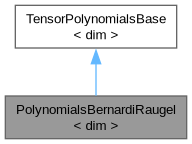 |
Reference documentation for deal.II version 9.6.0
|
 |
Reference documentation for deal.II version 9.6.0
|
#include <deal.II/base/polynomials_bernardi_raugel.h>

Public Member Functions | |
| PolynomialsBernardiRaugel (const unsigned int k) | |
| std::string | name () const override |
| void | evaluate (const Point< dim > &unit_point, std::vector< Tensor< 1, dim > > &values, std::vector< Tensor< 2, dim > > &grads, std::vector< Tensor< 3, dim > > &grad_grads, std::vector< Tensor< 4, dim > > &third_derivatives, std::vector< Tensor< 5, dim > > &fourth_derivatives) const override |
| virtual std::unique_ptr< TensorPolynomialsBase< dim > > | clone () const override |
| unsigned int | n () const |
| unsigned int | degree () const |
Static Public Member Functions | |
| static unsigned int | n_polynomials (const unsigned int k) |
Static Private Member Functions | |
| static std::vector< std::vector< Polynomials::Polynomial< double > > > | create_polynomials_Q () |
| static std::vector< std::vector< Polynomials::Polynomial< double > > > | create_polynomials_bubble () |
Private Attributes | |
| const AnisotropicPolynomials< dim > | polynomial_space_Q |
| const AnisotropicPolynomials< dim > | polynomial_space_bubble |
| const unsigned int | polynomial_degree |
| const unsigned int | n_pols |
This class implements the Bernardi-Raugel polynomials similarly to the description in the Mathematics of Computation paper from 1985 by Christine Bernardi and Geneviève Raugel.
The Bernardi-Raugel polynomials are originally defined as an enrichment of the (P_1)^d elements on simplicial meshes for Stokes problems by the addition of bubble functions, yielding a locking-free finite element which is a subset of (P_2)^d elements. This implementation is an enrichment of (Q_1)^d elements which is a subset of (Q_2)^d elements for quadrilateral and hexahedral meshes.
The BR_1 bubble functions are defined to have magnitude 1 at the center of face e_i and direction \mathbf{n}_i normal to face e_i, and magnitude 0 on all other vertices and faces. Ordering is consistent with the face numbering in GeometryInfo. The vector \mathbf{n}_i points in the positive axis direction and not necessarily normal to the element for consistent orientation across edges.
@f$x=1@f$ edge: @f$\mathbf{p}_2 = \mathbf{n}_2 (x)(y)(1-y)@f$
@f$y=0@f$ edge: @f$\mathbf{p}_3 = \mathbf{n}_3 (x)(1-x)(1-y)@f$
@f$y=1@f$ edge: @f$\mathbf{p}_4 = \mathbf{n}_4 (x)(1-x)(y)@f$
@f$x=1@f$ edge: @f$\mathbf{p}_2 = \mathbf{n}_2 (x)(y)(1-y)(z)(1-z)@f$
@f$y=0@f$ edge: @f$\mathbf{p}_3 = \mathbf{n}_3 (x)(1-x)(1-y)(z)(1-z)@f$
@f$y=1@f$ edge: @f$\mathbf{p}_4 = \mathbf{n}_4 (x)(1-x)(y)(z)(1-z)@f$
@f$z=0@f$ edge: @f$\mathbf{p}_5 = \mathbf{n}_5 (x)(1-x)(y)(1-y)(1-z)@f$
@f$z=1@f$ edge: @f$\mathbf{p}_6 = \mathbf{n}_6 (x)(1-x)(y)(1-y)(z)@f$
Then the BR_1(E) polynomials are defined on quadrilaterals and hexahedra by BR_1(E) = Q_1(E) \oplus \mbox{span}\{\mathbf{p}_i, i=1,...,2d\}.
Definition at line 84 of file polynomials_bernardi_raugel.h.
| PolynomialsBernardiRaugel< dim >::PolynomialsBernardiRaugel | ( | const unsigned int | k | ) |
Constructor. Creates all basis functions for Bernardi-Raugel polynomials of given degree.
k=1. Definition at line 24 of file polynomials_bernardi_raugel.cc.
|
inlineoverridevirtual |
Return the name of the space, which is BernardiRaugel.
Implements TensorPolynomialsBase< dim >.
Definition at line 165 of file polynomials_bernardi_raugel.h.
|
overridevirtual |
Compute the value and derivatives of each Bernardi-Raugel polynomial at unit_point.
The size of the vectors must either be zero or equal n(). In the first case, the function will not compute these values.
Implements TensorPolynomialsBase< dim >.
Definition at line 70 of file polynomials_bernardi_raugel.cc.
|
static |
Return the number of polynomials in the space BR(degree) without requiring to build an object of PolynomialsBernardiRaugel. This is required by the FiniteElement classes.
Definition at line 237 of file polynomials_bernardi_raugel.cc.
|
overridevirtual |
A sort of virtual copy constructor, this function returns a copy of the polynomial space object. Derived classes need to override the function here in this base class and return an object of the same type as the derived class.
Some places in the library, for example the constructors of FE_PolyTensor, need to make copies of polynomial spaces without knowing their exact type. They do so through this function.
Implements TensorPolynomialsBase< dim >.
Definition at line 253 of file polynomials_bernardi_raugel.cc.
|
staticprivate |
A static member function that creates the polynomial space we use to initialize the polynomial_space_Q member variable.
Definition at line 55 of file polynomials_bernardi_raugel.cc.
|
staticprivate |
A static member function that creates the polynomial space we use to initialize the polynomial_space_bubble member variable.
Definition at line 33 of file polynomials_bernardi_raugel.cc.
|
inlineinherited |
Return the number of polynomials.
Definition at line 151 of file tensor_polynomials_base.h.
|
inlineinherited |
Return the highest polynomial degree of polynomials represented by this class. A derived class may override this if its value is different from my_degree.
Definition at line 160 of file tensor_polynomials_base.h.
|
private |
An object representing the polynomial space of Q functions which forms the BR polynomials through outer products of these with the corresponding unit ijk vectors.
Definition at line 138 of file polynomials_bernardi_raugel.h.
|
private |
An object representing the polynomial space of bubble functions which forms the BR polynomials through outer products of these with the corresponding normals.
Definition at line 145 of file polynomials_bernardi_raugel.h.
|
privateinherited |
The highest polynomial degree of this functions represented by this object.
Definition at line 139 of file tensor_polynomials_base.h.
|
privateinherited |
The number of polynomials represented by this object.
Definition at line 144 of file tensor_polynomials_base.h.